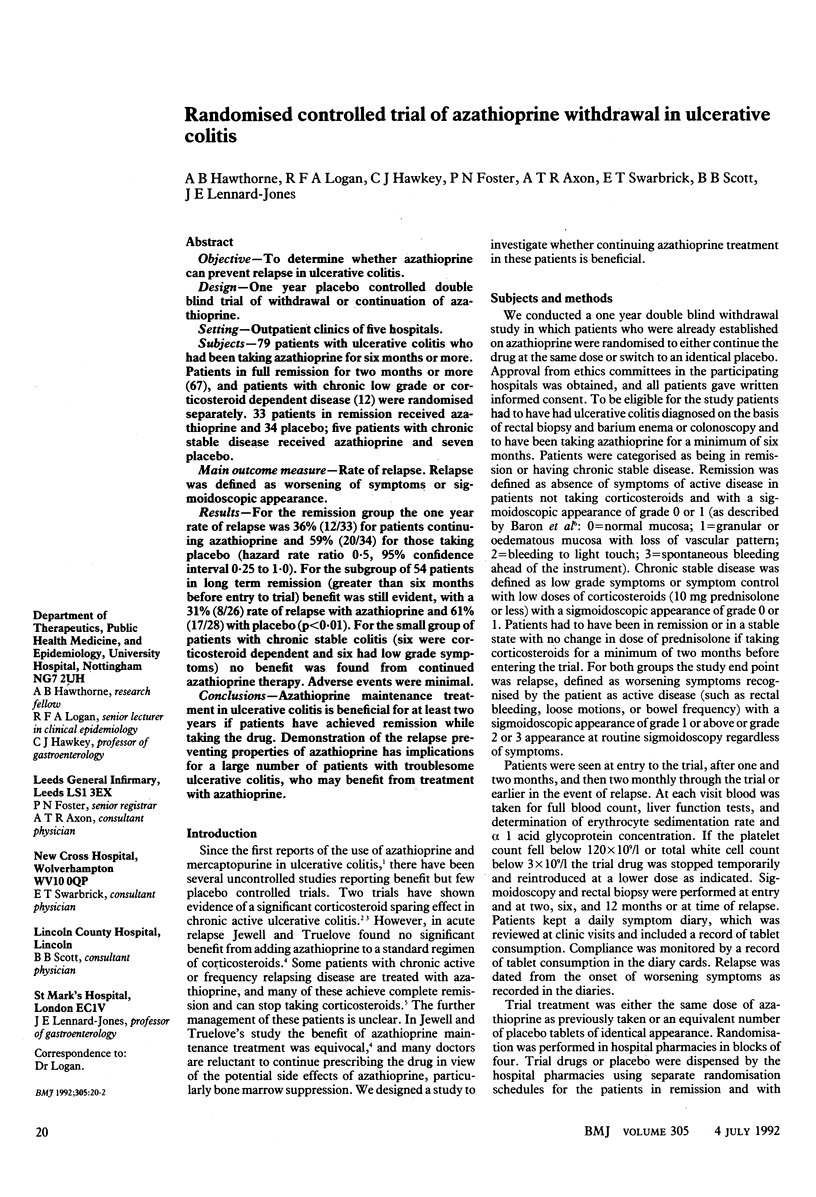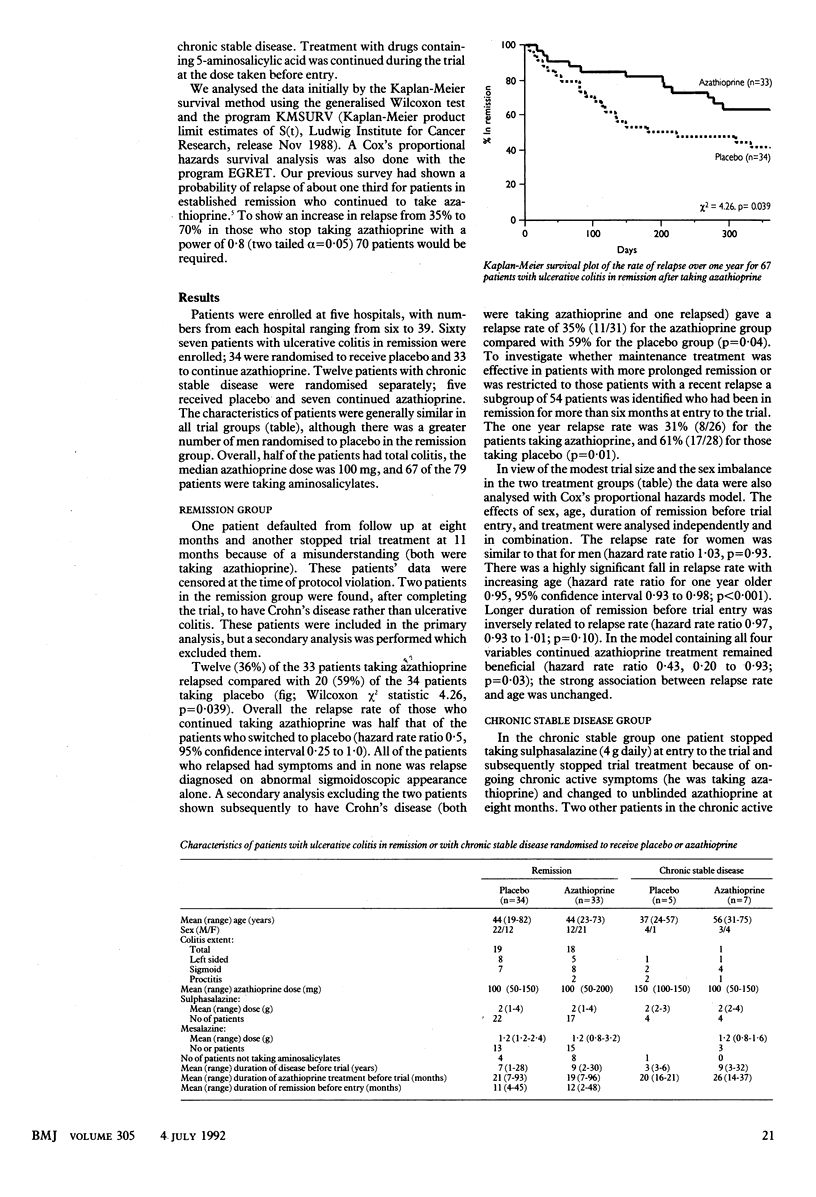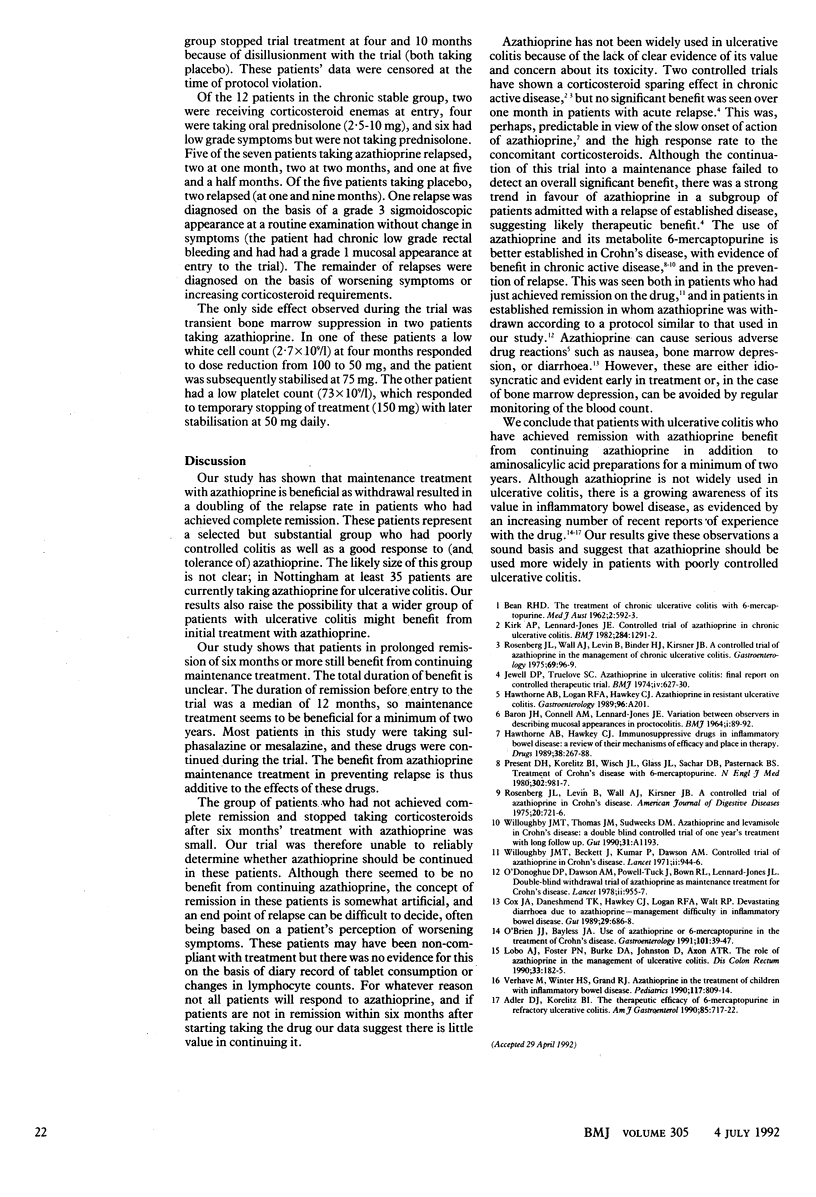Abstract
OBJECTIVE--To determine whether azathioprine can prevent relapse in ulcerative colitis. DESIGN--One year placebo controlled double blind trial of withdrawal or continuation of azathioprine. SETTING--Outpatient clinics of five hospitals. SUBJECTS--79 patients with ulcerative colitis who had been taking azathioprine for six months or more. Patients in full remission for two months or more (67), and patients with chronic low grade or corticosteroid dependent disease (12) were randomised separately. 33 patients in remission received azathioprine and 34 placebo; five patients with chronic stable disease received azathioprine and seven placebo. MAIN OUTCOME MEASURE--Rate of relapse. Relapse was defined as worsening of symptoms or sigmoidoscopic appearance. RESULTS--For the remission group the one year rate of relapse was 36% (12/33) for patients continuing azathioprine and 59% (20/34) for those taking placebo (hazard rate ratio 0.5, 95% confidence interval 0.25 to 1.0). For the subgroup of 54 patients in long term remission (greater than six months before entry to trial) benefit was still evident, with a 31% (8/26) rate of relapse with azathioprine and 61% (17/28) with placebo (p less than 0.01). For the small group of patients with chronic stable colitis (six were corticosteroid dependent and six had low grade symptoms) no benefit was found from continued azathioprine therapy. Adverse events were minimal. CONCLUSIONS--Azathioprine maintenance treatment in ulcerative colitis is beneficial for at least two years if patients have achieved remission while taking the drug. Demonstration of the relapse preventing properties of azathioprine has implications for a large number of patients with troublesome ulcerative colitis, who may benefit from treatment with azathioprine.
Full text
PDF


Selected References
These references are in PubMed. This may not be the complete list of references from this article.
- Adler D. J., Korelitz B. I. The therapeutic efficacy of 6-mercaptopurine in refractory ulcerative colitis. Am J Gastroenterol. 1990 Jun;85(6):717–722. [PubMed] [Google Scholar]
- BARON J. H., CONNELL A. M., LENNARD-JONES J. E. VARIATION BETWEEN OBSERVERS IN DESCRIBING MUCOSAL APPEARANCES IN PROCTOCOLITIS. Br Med J. 1964 Jan 11;1(5375):89–92. doi: 10.1136/bmj.1.5375.89. [DOI] [PMC free article] [PubMed] [Google Scholar]
- Cox J., Daneshmend T. K., Hawkey C. J., Logan R. F., Walt R. P. Devastating diarrhoea caused by azathioprine: management difficulty in inflammatory bowel disease. Gut. 1988 May;29(5):686–688. doi: 10.1136/gut.29.5.686. [DOI] [PMC free article] [PubMed] [Google Scholar]
- Hawthorne A. B., Hawkey C. J. Immunosuppressive drugs in inflammatory bowel disease. A review of their mechanisms of efficacy and place in therapy. Drugs. 1989 Aug;38(2):267–288. doi: 10.2165/00003495-198938020-00007. [DOI] [PubMed] [Google Scholar]
- Jewell D. P., Truelove S. C. Azathioprine in ulcerative colitis: final report on controlled therapeutic trial. Br Med J. 1974 Dec 14;4(5945):627–630. doi: 10.1136/bmj.4.5945.627. [DOI] [PMC free article] [PubMed] [Google Scholar]
- Kirk A. P., Lennard-Jones J. E. Controlled trial of azathioprine in chronic ulcerative colitis. Br Med J (Clin Res Ed) 1982 May 1;284(6325):1291–1292. doi: 10.1136/bmj.284.6325.1291. [DOI] [PMC free article] [PubMed] [Google Scholar]
- O'Brien J. J., Bayless T. M., Bayless J. A. Use of azathioprine or 6-mercaptopurine in the treatment of Crohn's disease. Gastroenterology. 1991 Jul;101(1):39–46. doi: 10.1016/0016-5085(91)90457-v. [DOI] [PubMed] [Google Scholar]
- O'Donoghue D. P., Dawson A. M., Powell-Tuck J., Bown R. L., Lennard-Jones J. E. Double-blind withdrawal trial of azathioprine as maintenance treatment for Crohn's disease. Lancet. 1978 Nov 4;2(8097):955–957. doi: 10.1016/s0140-6736(78)92524-2. [DOI] [PubMed] [Google Scholar]
- Present D. H., Korelitz B. I., Wisch N., Glass J. L., Sachar D. B., Pasternack B. S. Treatment of Crohn's disease with 6-mercaptopurine. A long-term, randomized, double-blind study. N Engl J Med. 1980 May 1;302(18):981–987. doi: 10.1056/NEJM198005013021801. [DOI] [PubMed] [Google Scholar]
- Rosenberg J. L., Levin B., Wall A. J., Kirsner J. B. A controlled trial of azathioprine in Crohn's disease. Am J Dig Dis. 1975 Aug;20(8):721–726. doi: 10.1007/BF01070829. [DOI] [PubMed] [Google Scholar]
- Verhave M., Winter H. S., Grand R. J. Azathioprine in the treatment of children with inflammatory bowel disease. J Pediatr. 1990 Nov;117(5):809–814. doi: 10.1016/s0022-3476(05)83349-9. [DOI] [PubMed] [Google Scholar]
- Willoughby J. M., Beckett J., Kumar P. J., Dawson A. M. Controlled trial of azathioprine in Crohn's disease. Lancet. 1971 Oct 30;2(7731):944–947. doi: 10.1016/s0140-6736(71)90268-6. [DOI] [PubMed] [Google Scholar]


